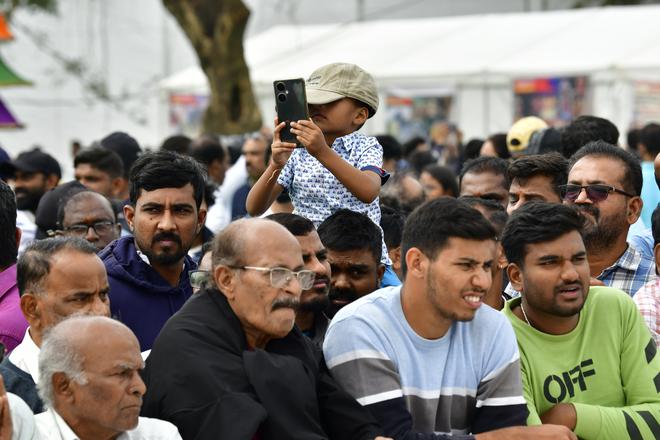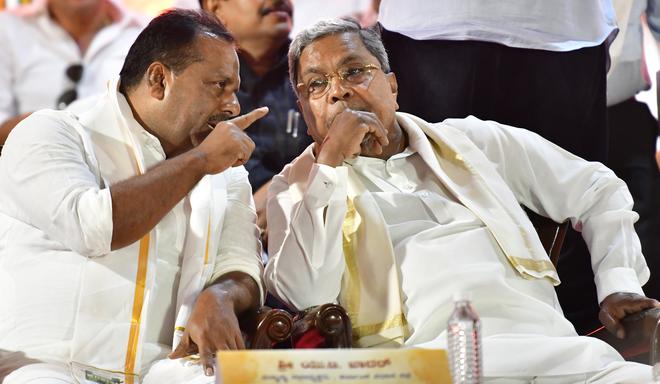The cries of “Bengaluru Kambala, Namma Kambala” rent the air as hundreds of pairs of colourfully-decked buffaloes and their athletic jockeys took to the jodu kare or double slush tracks, marking the beginning of the Bengaluru Kambala at Palace Grounds in the city on Saturday.
The two-day event is the first ever Kambala (slush track buffalo race) to be held in the State capital. The unique traditional sport from the coastal region of Karnataka captured pan-Indian imagination through Rishab Shetty’s 2022 blockbuster film, Kantara. The current edition in Bengaluru is part of the effort to popularise it among the urban population and promote it for breed conservation of the Indian buffalo.

Longest track
On Saturday, blanketed by overcast skies, over 180 pairs of buffaloes and their jockeys began participation across six categories — negilu hiriya, negilu kiriya, hagga hiriya, hagga kiriya, adda halage and kane halage — in the mega event that was witnessed by lakhs of wide-eyed spectators.
The first five categories are contests of speed: the pair of buffaloes that runs the fastest, wins. The last category, kane halage, is a display of force. The competing teams must splash water on the banners tied at a height of 7.5 feet and 6.5 feet at different points in the track. The higher the buffaloes spray water while they run, the greater their chances of winning.
This is also the first competitive kambala to have the longest track at 155 metres against the usual length of 145-147 metres.

The animals were transported in lorries from several taluks of Dakshina Kannada, Udupi and Kasaragodu, traversing an arduous journey of more than 300 kilometres along the lush Western Ghats to the IT city, accompanied by a team of owners, runners, caretakers and helpers.
To ensure no harm befalls the animals, each team also brought drums filled with 300 litres of water from the wells of Karavali for drinking and bathing purposes.

Rooted in agrarian society
Kambala is a traditional, folk sport born from the agrarian practices of the coastal Karnataka region. The word Kambala comes from ‘gampa kala,’ where gampa refers to wet mud or slush. A vast slushy paddy field was called a kambala gadde, and held huge significance among the people of Tulunaadu where historically paddy lands were a source of prestige as well as the only means of income. The first-ever documented kambala was held on February 2, 1970, in Bajagoli near Karkala in Udupi district.
The Kambala season usually begins after the southwest monsoon between November and March, at the end of the tilling season and before the planting of seedlings. In the earlier days, after levelling the land for transplanting, all the buffaloes involved in farming would be lined up and made to run in the slushy paddy fields, both as a form of entertainment and as a mark of respect. The winning animals would be sent home with rewards. Over the years, the cultural and religious fervour took on a competitive edge.
Bonhomie and backlash
The days leading up to the Bengaluru Kambala also witnessed a rare bonhomie of sorts as political rivals Congress and BJP were seen setting aside their ideological differences to organise the event. Puttur Congress MLA Ashok Kumar Rai and former BJP councillor in the BBMP Umesh Shetty – both hailing from the dominant land-owning Bunt community – joined hands to promote a century-old culture.
The event was also mired in controversy after BJP MP and former Wrestling Federation of India (WFI) president Brij Bhushan Singh – accused of sexual assault by women wrestlers – was invited to a felicitation event. After intense backlash, the organisers backtracked calling it an “oversight” and withdrawing the invitation.
Jallikattu and Kambala
Kambala is akin to Tamil Nadu’s Jallikattu, in that they are both traditional sports with animals – the former involves bull-taming and the latter is a buffalo race.
Another similarity is that they have both also courted legal trouble. In 2016-17, Kambala was stopped for the first time, following a High Court ban in response to a petition by animal rights group, PETA.
Similar to the Jallikattu row, after a lot of arguments for and against the practice, an Ordinance in 2017 paved the way for Kambala’s continuance. Now, the Prevention of Cruelty to Animals (Karnataka Second Amendment) Act, 2017, permits it to be conducted with restrictions to safeguard against the mistreatment of the animals.







